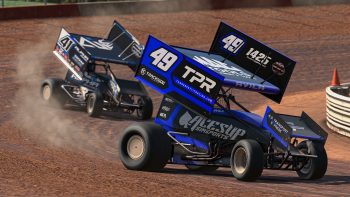
The iRacing.com Protest System – May, 2012
May 11th, 2012 by DavidP
“Racing incidents happen.” — Nim Cross
I must say that Nim’s statement is very accurate and profound. There have been literally thousands of forum strings, emails, video reviews, opinions and discussions over the years about how to deal with those cursed incidents and accidents on iRacing. Passionate discussions and ideas abound about the sporting code, safe driving, unsafe driving, intentional wrecking, blocking, sportsmanship, acceptable behavior, flaws in the protest system and ideas for more automation . . . to name a few.
There have also been literally thousands of protests filed by concerned members regarding perceived violations of the iRacing sporting code by other members. In 2010, for example, there were 1,945 protests filed and 3,541 filed in 2011. Those numbers only include accepted protests in which we created a “case.” In the past, if there was some missing information in the protest submission (for example, a replay if the protest was a racing-based incident) an accepted “case” was NOT created in our CRM system. Therefore, there were actually quite a few more protests than the numbers show above. More on that later.

As iRacing's membership rolls have increased so have the number of racing incidents . . . and protests.
“What is a CRM system you might ask? Or maybe you don’t really care! Well if you care it stands for Customer Relationship Management. It is a third party software package that records the complete history of our interaction with each iRacing member. We can see all the details about your membership, what you purchased, how long you have been a member, if you have called customer service and, if so, exactly why you called and how it has been resolved. FYI, we create a case for everything in customer service/technical support in the CRM system as well. We track how long cases are open, the result, how long before we contacted you back if you did not reach us live and things like that.
Like I said, we also use this system for protests (and appeals for that matter) so that everything is documented for each case created. Each member has a permanent historical record. For example, if 10 protests are filed against a member we know that; we also know how we resolved each protest. Staying with that example, we know if 10 different people filed the protests or if the same person filed 10 protests against that particular member. We track both sides of the protest in the system.
iRacing.com’s protest process is obviously unique in the world of sim racing or racing games. The centralized service itself including official racing is equally unique. How did this all come about? When we started iRacing, we felt the single biggest obstacle to the continuing evolution of online racing – even more than the technical challenges – was the lack of a global sim racing community.
“We felt the single biggest obstacle to the continuing evolution of online racing . . . was the lack of a global sim racing community.”
Additionally, there was no decent centralized arena for public racing and competition. In other words, it was a completely fragmented community and sport (or hobby, depending on how you look at it). Part of that was because there was no method for managing the frustration caused by wreckers or racers consistently driving over their heads and skill level, etc. As a result, sim racers often gave-up racing on public servers even when the technology was available and retreated back to the safety of their small groups or private leagues.
We set out to change that. Don’t get me wrong: Leagues are great. But we wanted to create (or at least re-invent) the sport of sim-racing so that there was an enjoyable and challenging environment for drivers of all experience and abilities, from “amateur” all the way up to pros; one that would attract real-world sanctioning bodies and create a world-wide sense of community. To do that you need to have public, open racing competition. But how do you get people to behave and drive appropriately based on their skill? That was obviously one of the fundamental questions we faced, and there was no easy solution.
We thought about the question long and hard from all the angles and niches of sim racers, including brand new sim racers. We worked even longer and harder to implement what we believed was a practical system that addressed those issues. As a result, we developed and engineered into the service our incident system, our license class and promotion system, our division system, our safety rating system, and our iRating system. That is just some of the automated functionality we built into the system — all to foster an environment of clean, public racing. We continue thinking about those issues and how well our systems are addressing them as well as whether what, if any, additional automation is desirable. And, needless to say, we have already tweaked all of those features many times over along our journey.
 Of course, we also decided to take it to the next step and create our own sanctioning and governing racing body which we called FIRST. We created a full Sporting Code at the core of FIRST to lay out the expectations and rules for racing, including a protest process and appeal system in which a racing steward would review and arbitrate each protest. We spent a lot of time deciding the tone and the goals of the protest process. Along the way we have tweaked and altered our approach based on what we have learned over the years reviewing and discussing thousands of protests. As many have said — and it is true — we are also a for-profit software company, not just a racing sanctioning body. Luckily, we found the goals of both to be mainly in concert.
Of course, we also decided to take it to the next step and create our own sanctioning and governing racing body which we called FIRST. We created a full Sporting Code at the core of FIRST to lay out the expectations and rules for racing, including a protest process and appeal system in which a racing steward would review and arbitrate each protest. We spent a lot of time deciding the tone and the goals of the protest process. Along the way we have tweaked and altered our approach based on what we have learned over the years reviewing and discussing thousands of protests. As many have said — and it is true — we are also a for-profit software company, not just a racing sanctioning body. Luckily, we found the goals of both to be mainly in concert.
Our goal is simple. Create a good, clean racing and family environment for our members no matter your level of skill or passion. Easier said than done. With all the built-in systems like license class and safety rating geared to reward clean driving, we still get thousands of protests per year. That’s not really a shock, I suppose. Thankfully, there are a lot of people doing a lot of racing. I often say (and our marketing material states) we have over 1,500 official races per week. In fact, the numbers are much higher, as that 1,500 figure only counts the starting times of the different series and races. When you take into account all the different splits, we actually have well over 5,000 official races per week – which adds-up to more than 250,000 unique races every year. No wonder our membership has driven over 500,000,000 laps! That is a lot of potential for racing incidents, frustration and tempers to flare! Luckily flaring tempers are the exception not the rule.
We obviously can’t have a race steward in every race, not by a long shot. Even if we did that does not solve all the problems. For example, we do have live race stewards for our World Championship races. In fact we have three or four experienced stewards in each race, plus an additional video incident review system in which four other people review each incident! With all that there is still controversy and second-guessing! I guess just like the NASCAR Sprint Series or any real-world series, even with just one race per week to officiate, it is tough to keep everyone happy and there are still problems!
Contrary to what some might think, our system works pretty well. We are assigning fault or no fault which, by its very nature, is going to upset one or both parties. Sometimes we catch someone simply completely losing control. Those are the easy cases. Other times, it is more subtle and everything in between. Often it is hard to know what really happened and what truly was someone’s intention. Did someone purposely block you or did they lose concentration because their son walked across the room? Maybe they just messed-up and did not see you. That is why the CRM system is so important for racing-based protests. Is this the first time the guy blocked someone or dived-bombed someone in a corner? Or is this the third time they have been protested for the same behavior? If it’s the third time, what happened with the other cases? Is it the third time out of 2,000 races or the third time in 10 races? What are the two different sides saying? Is the person at fault understanding the issue, being respectful and willing to work at correcting it? Are their actions consistent with what they are saying they will do to correct it or are they full of hot air? Those sort of questions factor into whether we decide to coach someone and offer suggestions, warn them or remove them from the system for a period of time.
Earlier I provided the number of protest cases created, so now let me offer you a number for another category: punishments. In 2010 we suspended 224 people for a specific length of time and banned 43 outright. Banned means there is no time table in allowing them to rejoin iRacing. It could mean forever. In 2011 we suspended 598 people and banned 52.
We are certainly not proud, nor do we feel good about, suspending someone. But the needs of the many outweigh the needs of the few at the end of the day. (By the way another Star Trek reference is below) If one person is ruining the experience for many, especially habitually, we take action. For the record, we get criticized that we are too tough on people . . . and too easy on people.
“Are we completely satisfied with the protest system and process? No, not completely. It works but there’s always room to improve and we will.”
That brings me to the next subject. Are we completely satisfied with the protest system and process? No, not completely. It works but like anything on iRacing, there’s always room to improve and we will.
One thing we did in the software update/build just a couple weeks ago that was not mentioned in the software release notes was give ourselves a lot more flexibility. In the past, we had three choices: Suspend someone, shut off their in-sim communication (voice chat and or text chat) or make the forums “read only.” (I guess a fourth would be a combination of making forums “read only” and shut off text chat. Actually, we could also shut off their forums completely.)
Anyway, with just those three basic choices (in-sim communication, forums, suspend from service), some tough decisions had to be made that frankly in some cases could have been more fair. But our options were limited. In some cases, we wanted to send a message for an incident but felt at the end of the day a suspension was too tough a penalty, so the person merely received a warning when something more serious may have been warranted. On the flip side, in some cases we felt something had to be done and while a suspension was too tough we did it anyway because, again, that was the tool we had.
The good news is with this build we have added several options to the three we already had. Now we can suspend parts of the service to a member for a period of time instead of suspending them from the whole service. (Although we can and will still suspend people from the service entirely.) For example, we can suspend people from “contact” with other members, so they will still be able to test and time trial but will be ineligible to participate in race sessions with other members. We can suspend people from public racing but they can still do hosted sessions, time trials and testing. We can suspend people just from official racing and qualifying but they can do everything else including hosted sessions and open practice. We now have about seven or eight options, giving us much more flexibility. In addition, now if you are suspended from some part of the service (not including in-sim communication or forums), you will be able to see when the full service will be restored. That comes under the heading “better communication.”
You’re still reading this? Wow, good for you. Might as well finish reading at this point.
Earlier, I noted that we create a “case” for every properly submitted protest. Going forward we will create a case for every protest, properly submitted or not, because that is also valuable information in several regards. We have also created more categories of protests, so we can review things on a macro-level and identify trends. We have also reviewed all of our form letters, added some new ones and rewritten some old ones, and revised our criteria for when to use which letters. We have also given ourselves more room to include additional detail and notes when communicating with members, and have encouraged our race stewards to take advantage of that opportunity. This is important because using the correct reply letter and providing added detail can be the difference between a member getting even more frustrated or starting to at least understand our position. Again, communication is critical. On that note, we plan on providing macro level protest results each quarter.
If you have been a bad boy or girl, you may have also seen less of Nim Cross’s name recently. Nim is our chief race steward and, for those of you who are new to the service, he has historically reviewed every single protest. The reason you won’t see Nim’s name as much is not because he doesn’t treat each protest with an unrelenting sense of urgency or because he is not super awesome; it is because we are adding more resources in this area so Nim might not be the one reviewing your protest in the future. You will start seeing emails from the race steward’s office instead of from Nim. I wish we had many more people in this area, because they could really get involved in not only reviewing protests but in more “positive” measures like coaching and personal feedback, and also serving as “random” in-race stewards and being available for secondary protest review as a matter of process.
“Another big project in the works is automating the protest process.”
You may say, why not have the community get involved to help? They know sim racing and proper sportsmanship. Although I agree that is very true, the protest process really needs to be very organized. Everything needs to be documented in our systems properly, and internal communication is also a key. Long story short, we absolutely must be able to count on people doing this as a job.
We’ll keep thinking about resources and how we might tackle that within our budget, but automation could help as well. For example, there’s a project on the table now that would automatically boot a driver from a race if he gets xyz incident points. Hit the magic number and race control would black flag the driver, and he’d be forced to the pits for good. Then the guy/lady can’t race again until the steward flips the switch.
I wouldn’t worry about this being too draconian. We would start pretty high, for example 20+ incident points in a race as the threshold, but at least it will take that guy out of the race who is just a menace. You know the guy I am talking about! He will eventually get suspended anyway probably and have a hundred excuses, but this just gets him out fast until we can figure out what is going on before he or she does any more damage.
Another big project in the works is automating the protest process. It always bothered me that protests are probably filed at a member’s peak of frustration. As it is now, they have to thumb (or scroll) through the sporting code with their eyes glazing over reading that thing, trying to figure out what to do — and all the while steam is coming out their ears because some hero wrecked them on the last lap and they got ripped-off from their first podium!
Khaaannnn!!!!
Believe me, it’s not our intention for iRacing to trigger Kirk-like facial expressions! With the automation or semi-automation of the protest process, you will be able to click on “File a Protest.” There will be a drop-down requiring you to fill out necessary information including a drop down of the key Sporting Code sections, and all you have to do is click on it. The process will be very intuitive.
Obviously, since it will be so much easier to file a protest, we may institute a one hour waiting (cooling-off) period or something like that before you can file a protest in order to minimize the frivolous protests. We’re still thinking about that to some degree.
Just like most things worthwhile, sim racing is very tough for most of us – which is probably why we like it so much. On that note, I want to sincerely thank all of our members for being unbelievably patient with one another and incredibly supportive of each other generally on the track, because we all make mistakes. Also, thanks also for being patient and supportive of us as we try manage the racing here because, as Nim said, racing incidents do happen. All these things we have worked on are very important and we will continue to try and make your time on track as pleasurable as we can — but all of you are what makes that work at the end of the day!!!
Good racing,
Tony
















































